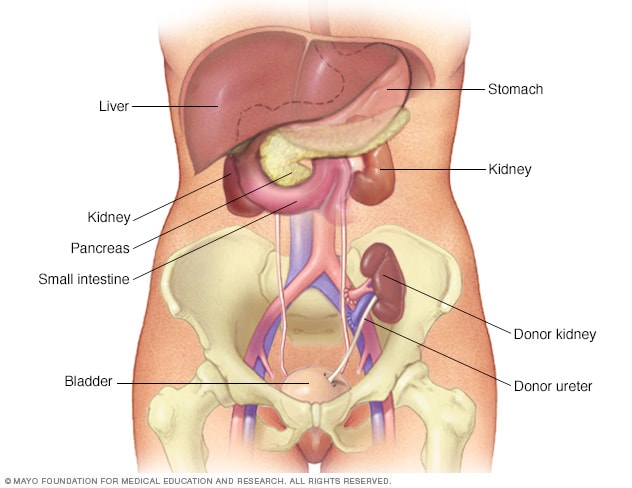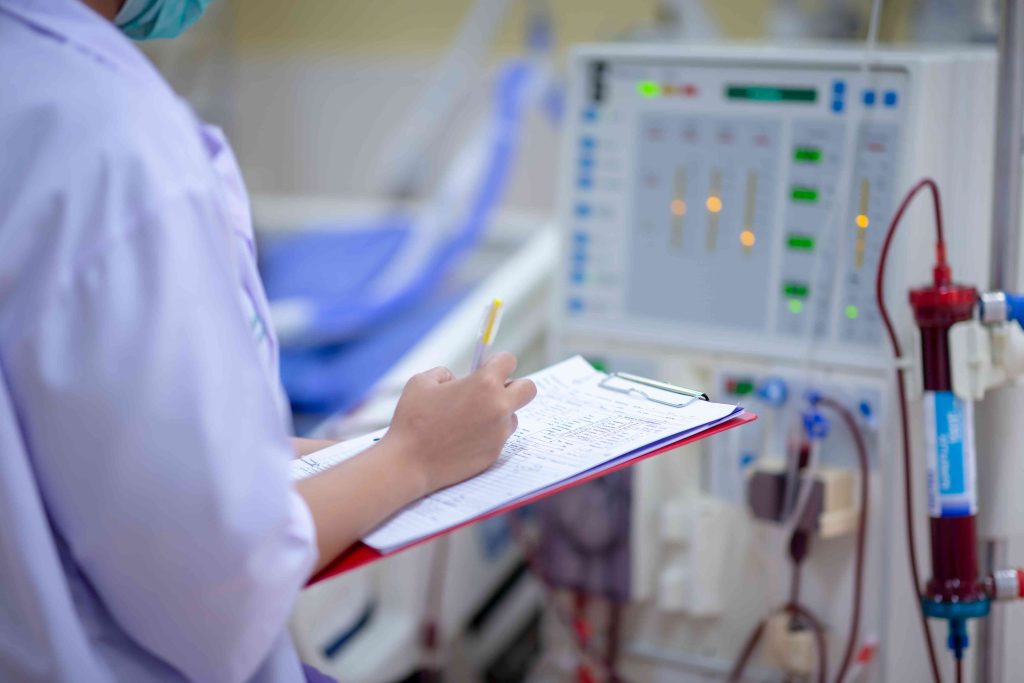What is a Kidney Transplant?
A kidney transplant is a surgery to place a healthy kidney from a living or deceased donor into a person whose kidneys no longer function properly.The kidneys are two bean-shaped organs located on each side of the spine just below the rib cage. Each is about the size of a fist. Their main function is to filter and remove waste, minerals and fluid from the blood by producing urine.
When kidneys lose this filtering ability, harmful levels of fluid and waste accumulate in the body, which can raise blood pressure and result in kidney failure (end-stage renal disease). End-stage renal disease occurs when the kidneys have lost about 90% of their ability to function normally. End-stage renal disease occurs when the kidneys have lost about 90% of their ability to function normally.

Why might I need a kidney transplant?
You may need a kidney transplant if you have end-stage renal disease (ESRD). This is a permanent condition of kidney failure. It often needs dialysis. This is a process used to remove wastes and other substances from the blood.The kidneys:
Remove urea and liquid waste from the blood in the form of urine. Urea is made when foods containing protein, such as meat, poultry, and certain vegetables, are broken down in the body. Urea is carried in the blood to the kidneys.- 1. Balance salts, electrolytes, such as potassium and sodium, and other substances in the blood
- 2. Make erythropoietin, a hormone that helps red blood cells form
- 3. Regulate blood pressure
- 4. Regulate fluid and acid-base balance in the body to keep it neutral. This is needed for normal function of many processes within the body.
Some conditions of the kidneys that may result in ESRD include:
- 1. Repeated urinary infections
- 2. Kidney failure caused by diabetes or high blood pressure
- 3. Polycystic kidney disease or other inherited disorders
- 4. Glomerulonephritis, which is inflammation of the kidneys’ filtering units
- 5. Hemolytic uremic syndrome, a rare disorder that causes kidney failure
- 6. Lupus and other diseases of the immune system
- 7. Obstructions
Other conditions, such as congenital defects of the kidneys, may result in the need for a kidney transplant.
There may be other reasons for your healthcare provider to recommend a kidney transplant.
What are the risks for kidney transplant?
The new kidney may be rejected. Rejection is a normal reaction of the body to a foreign object or tissue. When a new kidney is transplanted into a recipient’s body, the immune system reacts to what it thinks is a threat and attacks the new organ. For a transplanted organ to survive, medicines must be taken to trick the immune system into accepting the transplant and not attacking it as a foreign object.The medicines used to prevent or treat rejection have side effects. The exact side effects will depend on the specific medicines that are taken.
Not everyone is a candidate for a kidney transplant. You may not be eligible if you have:
- 1. Current or recurring infection that cannot be treated effectively
- 2. Cancer that has spread from its original location to elsewhere in the body
- 3. Severe heart or other health problems that make it unsafe to have surgery
- 4. Serious conditions other than kidney disease that would not get better after the transplant
- 5. Failure to follow the treatment plan
There may be other risks depending on your specific medical condition. Be sure to discuss any concerns with your transplant team before the procedure.
How is a Kidney Transplant Performed?
A kidney transplant consists of the operation in which a healthy kidney from a living or dead donor is placed within the body of a patient who has reached end-stage kidney disease. The surgeon makes an incision in the patient’s lower abdomen to allow the placement of the new kidney, which is then connected to the patient’s blood vessels and urinary tract system. The unhealthy kidneys of the recipient are usually left in place unless they present any problems. Additionally, patients are required to take immunodulators after the transplantation to prevent the rejection of the new organ. The process usually lasts for a period of approximately 3-4 hours and calls for monitoring of a patient after the surgery.A kidney transplant is generally safe, but like any surgery, there are risks involved. Some of the potential risks include:
Organ Rejection
The immune system may recognize the transplanted kidney as foreign and attempt to reject it. This is why immunosuppressive drugs are required to suppress the immune response. However, long-term use of these medications can increase the risk of infections and certain cancers.Infection
Immunosuppressive medications increase the risk of infections, as the immune system is weakened. Post-surgery, there’s also a risk of infections at the incision site, urinary tract, or in the kidney itself.Blood Clots
After surgery, there is a risk of developing blood clots that could affect the kidney or other organs. Kidney Dysfunction or FailureSometimes, the transplanted kidney may not function immediately, or it may fail after some time. This could require dialysis again or even another transplant.
Medication Side Effects
Immunosuppressive drugs can have side effects such as weight gain, high blood pressure, elevated cholesterol, bone thinning (osteoporosis), and increased risk of diabetes. Long-term management of these side effects is crucial.Cancer Risk
Long-term use of immunosuppressive medications increases the risk of developing certain cancers, particularly skin cancer and lymphomas. Graft-versus-Host Disease (GVHD)This is a rare but serious condition where the donor’s immune cells attack the recipient’s tissues, typically seen in organ transplants from living donors, especially if there are compatibility issues.
Complications from Surgery
As with any surgery, there are risks such as bleeding, injury to nearby organs, or problems with anesthesia.However, kidney transplant recipients must stay on lifelong medications, undergo regular medical checkups, and make lifestyle modifications to manage their kidney health and prevent complications.

